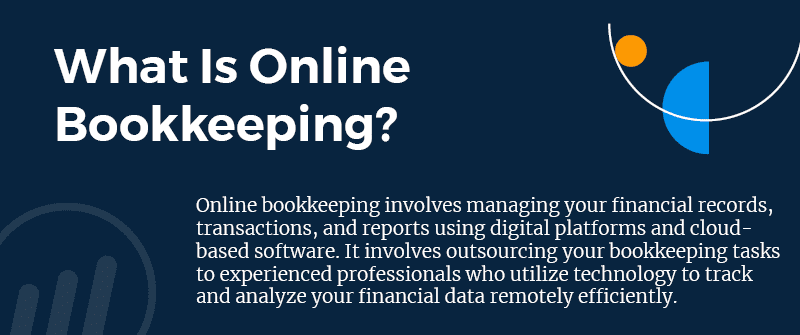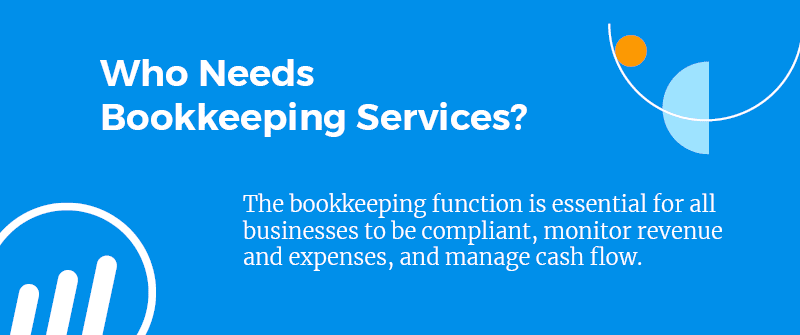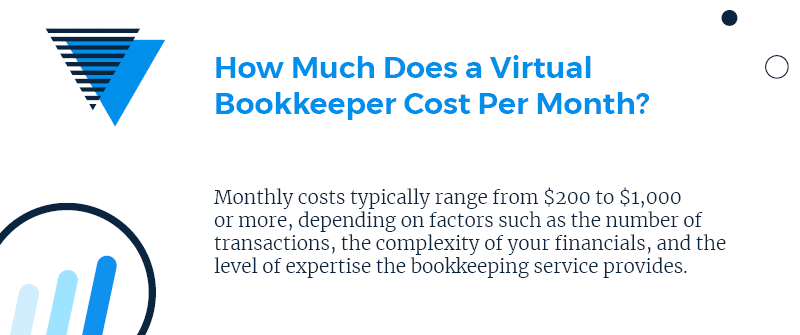
Small businesses outgrow their bookkeeping solutions all the time. It’s one of the hallmarks of growth. Entrepreneurs usually start out doing their books for the sake of control and knowledge, but this solution isn’t scalable. That’s why savvy entrepreneurs begin to look for a bookkeeper, so they can focus on growing the business. More and more businesses have started using monthly bookkeeping services because of their scalability and cost. Gone are the days when entrepreneurs have to search for “small business bookkeeping services near me” and choose the best local vendors. Instead, online bookkeeping allows you to find the best for your business, wherever possible.
Efficient bookkeeping is a pillar of any successful business, enabling you to track your financial health and make informed decisions, so let’s dive into the practice of online bookkeeping and answer common questions.
What Is Online Bookkeeping?
Online bookkeeping involves managing your financial records, transactions, and reports using digital platforms and cloud-based software. It involves outsourcing your bookkeeping tasks to experienced professionals who utilize technology to track and analyze your financial data remotely efficiently. Online bookkeeping services offer a range of benefits, making them an attractive option for small businesses seeking streamlined financial management, including cost savings, time savings, and expertise.

Qualities of Virtual Bookkeeping Services
The best online bookkeeping services will have these 10 qualities:
- Accuracy – Accuracy is the defining quality of a bookkeeping service. If the books are not accurate, then the decisions you make based on your financials are misinformed. Additionally, time could be better for finding and correcting errors. Do we need to harp on this any more? Accuracy is everything.
- Timeliness – Timeliness takes a close second to accuracy. Books must be regularly updated in small businesses to understand cash flow, revenue, and expenses. Additionally, timeliness helps small businesses make informed pivots as needed.
- Reliable Communication – Communication is pivotal to every successful business partnership. With bookkeeping services, it’s important that executives can have their financial questions answered to make decisions.
- Expertise – Remote bookkeeping services must leverage their bookkeeping expertise as well. Because their business is built off of providing bookkeeping services, they should be able to problem solve and increase efficiency.
- Scalability – The best bookkeeping services can grow with you. Ideally, bookkeeping services can also provide controllership and CFO-level services. This will provide consistency across many stages of growth for your business.
- Clear Pricing Model – Financials can be complicated. One month you could have 100 transactions, and the next, you could have 30. It’s important to know how you will be charged each month so you can appropriately plan.
- Industry Experience – While bookkeeping basics remain the same, SaaS accounting vs. non-profit accounting vs. restaurant accounting is very different. Choose bookkeeping services with experience accounting for your industry or a similar modeled industry. Otherwise, you’ll have to do additional research and training for them.
- Happy Customers – Happy customers are the tell-tale sign of a good business. Ask for references and read reviews when looking for outsourced bookkeeping services.
- Technology Expertise – The financial technology industry is vast and overwhelming. Bringing in virtual bookkeeping services with expertise and experience with financial technology is very valuable. The best services have resident technology accountants to help set up the proper flow of information between different systems.
- A Dedicated Employee to Your Account – The best remote accounting firms dedicate a single employee to your account instead of rotating bookkeepers. This way, the bookkeeper is efficient and understands your business.
Can I Do My Own Small Business Accounting?
Yes, you can do accounting for your own small business, but it’s not necessarily an advantage to do so. Many business owners do their own accounting at the beginning of their business. The low transaction volume and need for understanding revenue and expenses make this suitable. Small business owners should offload this function as the business grows to build something more scalable in their back office.
Outsourcing bookkeeping services is a scalable way to improve your accounting function. By outsourcing your bookkeeping to professionals, you can focus on growing your business, knowing your financials are in the hands of experts. Additionally, an outside perspective on your business and financials can be a competitive advantage compared to other small businesses.
Who Needs Bookkeeping Services?
The bookkeeping function is essential for all businesses to be compliant, monitor revenue and expenses, and manage cash flow. Having a bad bookkeeping function is simply bad business. Therefore, every business needs bookkeeping services, and the service needs to be done well.

How Does Virtual Bookkeeping Work?
Virtual bookkeeping operates through cloud-based software and secure online platforms. The process begins by selecting a reputable online bookkeeping service that aligns with your business needs. After engaging with the service, you will provide access to your financial software and platforms. The bookkeeper will use these platforms to enter and categorize transactions, reconcile accounts, generate financial statements, and provide ongoing support remotely. This collaborative approach allows real-time access to your financial information while keeping your data securely stored in the cloud.
What Services Should a Bookkeeper Provide?
The best online bookkeeping services offer a comprehensive range of services tailored to your business requirements. These may include:
- Revenue and Expense Tracking: A bookkeeper will accurately record and categorize all your business expenses, ensuring that you have a clear overview of where your money is going. On the flip side, they will do the same with revenue. This helps you understand your revenue streams on a deeper level.
- Accounts Payable and Receivable Management: Bookkeepers can handle the management of your invoices, payments, and customer billing, ensuring that your cash flow remains steady.
- Credit Card and Bank Reconciliations: Bookkeepers will reconcile your credit card and bank statements with your accounting records to identify any discrepancies or errors, ensuring the accuracy of your financial statements. This service saves a lot of time and future headaches!
- Payroll Processing*: Bookkeepers can handle payroll calculations, including deductions and taxes, ensuring your employees are paid accurately and on time.
- Financial Reporting*: A bookkeeper can generate monthly financial reports, such as profit and loss statements, balance sheets, and cash flow statements, giving you a clear understanding of your business’s financial performance. These monthly financial statements can provide in-depth understanding of your company’s financial health. More in-depth reporting, such as cashflow reports, forecasts, or KPI dashboards, is usually not performed by a bookkeeper but more of a controller-level accountant.
*These services are not standard across all bookkeeping services.
Do I Need QuickBooks If I Have a Bookkeeper?
Yes, you still need Quickbooks or another accounting platform if you have a bookkeeper. QuickBooks is a popular online bookkeeping software that simplifies bookkeeping tasks and provides robust financial management capabilities. However, businesses still need a bookkeeper to manage and complete these tasks. In other words, Quickbooks is a tool that allows bookkeepers to do their job efficiently. Other accounting software options are NetSuite, Xero, and Sage Intacct. Quickbooks Online is our recommended best bookkeeping software for small businesses because of its simplicity, cost, and integration ecosystem.
How Much Does a Virtual Bookkeeper Cost Per Month?
The cost of virtual bookkeeping services varies significantly depending on the complexity of your financials, the volume of transactions, and the specific services required. Most virtual bookkeeping services offer flexible pricing options tailored to your business needs. Monthly costs typically range from $200 to $1,000 or more, depending on factors such as the number of transactions, the complexity of your financials, and the level of expertise the bookkeeping service provides.

The value of a bookkeeping service is the expertise and time savings. Online bookkeeping services for small businesses are typically staffed with expert personnel who have managed many different books. They also have a team of other professionals to rely on to help make processes (like payroll services) more efficient and troubleshoot if need be. Outsourced bookkeeping saves business owners lots of time. The amount of money you spend on bookkeeping will prove to be worthwhile as you save money
How Milestone Can Help:
At Milestone, we understand the importance of efficient financial management for small businesses. We pride ourselves on being the best online accountants for small businesses. Our team of experienced bookkeepers and accountants is dedicated to providing top-notch virtual bookkeeping services tailored to your unique needs.
We offer comprehensive bookkeeping and accounting services, including CFO services, forecasting, reporting, financial dashboards, and meaningful financial statements. Our team works collaboratively with you, providing personalized support and insights to help you make informed financial decisions and achieve your business goals. Reach out to us today to have your back office help your business reach its milestones.
Related Content

How Much Should An Entrepreneur Set Aside For Taxes?
The amount an entrepreneur should save for taxes is influenced by many factors, such as total annual income, type of ...

Cash Flow Management For Entrepreneurs
Prioritizing cash flow management ensures that your venture remains agile, competitive, and poised for future success.

Accounting For Medical Practices
In medical practices, choosing the right accounting method is crucial for maintaining financial health and compliance. Learn more about cash ...
Stay in the know